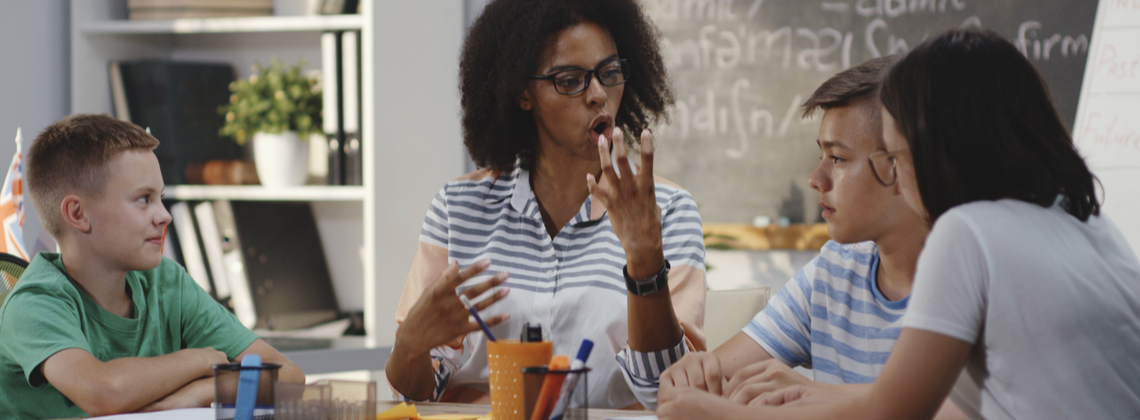

Every day in French language classrooms around the world teachers are trying to find new and more effective ways for their students to learn. Playing games on computers and tablets, using smart boards to direct group activities, moving around with pens and colored paper or even bringing in real life props makes language learning fun and can help students focus on communication. If you choose the right activity, it can boost engagement, encourage motivation and foster creativity in learners. Games also distract students from affective filters and anxiety that can get in the way of fluency.
For French teachers everywhere games can also be a headache. Letting the class loose on an activity and then hearing the students all switch from French to English has happened in many a lesson. What if they pronounce everything wrong and you can’t be there to model the correct version? What if they don’t know the word and can’t find it in their dictionary? How about the student that just sits there and refuses to play while the rest of the class enjoys the lesson?
But even if you’ve tried a few games, you haven’t necessarily tried them all. It also turns out some may be easier to play and more conducive to learning than others. This article will take you through the benefits of using games in a French lesson and provide a few sample activities to get you started.
Why introduce classroom games?
If the idea sounds daunting, just imagine doubling or even tripling student engagement in one go! Keeping students engaged is one of the most important goals of a teacher. When considering what to prioritise in a lesson, a French teacher may select vocabulary, grammar rules or dialogue but all of these elements are concerned with direct instruction and learning.
Nonetheless, the French that students actually use when they are speaking is a result of what they have acquired not learned. What’s the difference? Acquisition happens when students are repeatedly exposed to French input at a level that allows them to both notice and trap the input in short-term memory. It then moves over to long-term memory and becomes more robust as they use it and are exposed to a certain word, phrase or concept in diverse situations.
Once receptive knowledge has been acquired, students have to actually use their French to communicate. That’s why playing games is such a great way of getting students to speak French. When you are playing you’re engaged because you’re focused on the end result. Time is often of the essence depending on the activity and this means there’s no opportunity to mull over vocabulary choice or try to recall a grammar rule. Language use happens automatically, much like it should in real life.
We also put up less mental blocks when we are happy. This means French has an easier time getting in. It helps when language itself is the subject of the game– such as when students play Scrabble in French. The extra cognitive energy spent arranging letters, checking answers in the dictionary and looking at the board helps to ensure new words and the correct French spellings are logged in memory.
Finally, games can be a great way of getting your students to drive the activity. It shouldn’t just be the French textbook makers who decide which words students learn. Language is meant to be used so getting the class to generate their own vocabulary list is crucial. These should be words they need to talk about their life and day-to-day. Games often generate a number of “Teacher, how do you say this in French?” type of questions which are just the sort of thing you should be after!
Games and technology
Students have always loved trying the latest and greatest tech at school. What’s new is that recently these games have found their way into the language classroom. Gone are the days of confinement in a language lab with tape-recorders. Tablets, smart boards and computers can now be used to run French activities for every level learner.
Students love to relate what they are learning to an activity they enjoy as it helps them bridge the gap between classroom study and real-life use. This rule can apply to anything, even French. Minecraft is a perfect example of this. You may have heard your students talking about this PC game that has grown into one of Microsoft’s most popular tools, something they are now aiming to roll out in schools. It’s a strategy game in which individuals explore the world, creating anything they want as they move through different levels.
Now imagine context driven games for language learners where your character walks into a restaurant and has to order a meal in French to get a certain amount of points. French language games like this actually exist!
Fun French games for students
For French teachers, finding new things to do in the classroom can be a tricky and time-consuming task. It’s easy to fall into a rut and stick with the textbook suggested activities or tried and true methods you’ve been using for years. Plus, with so much out of school time spent lesson planning and correcting homework, there’s not always a lot leftover for inventing new games.
That’s why we’ve put together a list of some really simple activities you can start implementing in your classroom without much effort. We’ve recommended them based on their no-tech approach but there are plenty of free app driven activities you can try too including WordUp for Android and iOS, a new word search game for French vocabulary.
1. Memory game
This one is a classic and can be used to test French vocabulary knowledge and question and answer skills. Assemble a tray of objects which are then covered up after the players spend 30-60 seconds memorizing them and their French names. Contestants use their French to spot what’s missing from the tray. You can also use pictures if you can’t find the objects. It’s an awesome way for students to learn some new French vocab, and a great method of introducing related words. It’s also something that doesn’t take much preparation time and can be a lot of fun for the whole classroom.
2. Shopping list
Another popular game is “I went to the shops.” This one is simple: A group sits in a circle and each player takes a turn adding a new item to the shopping list. Every time an item is added, the list is repeated in full. This is a great activity for those looking to boost their French pronunciation skills. Combining it with descriptions and phrases adds a new layer of difficulty making it perfect for all ages and levels in French. You can even do this for hobbies, wish lists or future plans!
3. Matching
Matching picture games have been a handy tool for teachers in the past. Lay out a series of image cards then teach the French words that go with them. Get the players to match them up. They need to pronounce each French word before scoring on a card. Next, have them look up a set of their own words and create images with pen and paper or Google search. Make personalized variations of the game that utilize words your students are interested in learning!
4. Word chains
This a short game that works very well for students who want to express their creativity. It also allows students to showcase the extent of their vocabulary knowledge. The goal of the game is to continue a chain of words where each new word has to begin with the last letter of the previous word. For example: fromage, ends in an “e” so the person after must choose a word like éléphant. It’s a good workout for spelling and can help get students to notice common French word endings too. Try using a theme to get the students and players into more subject and scenario based schemas. After doing this in large groups, you can begin to use all of the words collected as part of a homework assignment or activity.
5. Smaller groups
This is a physical game to get students switched on during a lesson. If you have an opportunity to go outside or play in an open space then this should be your first choice. The object is to divide the group into smaller and smaller groups by calling out descriptions in French. Use anything from shoe color to hair style. You can also adapt it to different lessons, for example make statements about favorite things, future plans, family members etc. It’s an awesome listening game and will test their ability to recognize new vocabulary and phrases. Once you’ve had a go elect a student leader and time them to see how long it takes to separate people out into single groups.
6. Bingo!
Bingo is a popular game with teachers. Create a set of cards containing French words or numbers. Alternatively you can download a grid with images. Announce items in French and have the students cross them off. The first student with a full row should read his or her answers out loud and have the class evaluate if it’s a win. This activity is excellent for developing listening skills.
Interested in more fun ideas? Try our post on using YouTube to inspire your students to practice their French at home.
Rules for play
There are many benefits to using games in the classroom but you will want to introduce a few rules beforehand.
- Always speak in French. This is a no-brainer but it’s helpful to repeat before you start playing. Make sure students have the French phrases they need to request definitions of new vocabulary that comes up or ask questions if they get confused.
- Listen to the instructions. It can be tempting for students to jump right into activities but you will want to be sure they know how to play first. For beginner groups you can provide the instructions in both French and English or mime them to avoid having to use English in the classroom.
- Don’t worry about mistakes. Trying your hardest means speaking French in any way you can. Mistakes are part of the learning process and they are bound to happen. Ensure students try to give answers and teach them to focus on communication and not worry about any mistakes they might make.
- Be fair and respectful to others. Games can get out of hand, particularly in large classes. You might want to teach a few politeness rules in French or some standard vocabulary about turn-taking and then remind learners to maintain a classroom environment in which everyone feels welcome.
- Remember to have fun. Competition is great because it can spur students to use their French in new and creative ways but not when winning becomes the sole object of the game. Playing games should be about having fun and learning! If you sense a particular group is taking a game too seriously, remind them to relax and enjoy themselves or maybe choose a new game that’s less competitive.
Share resources with other language teachers
The great benefit to these games is that you can adapt them to fit any lesson and replicate them in other language classrooms. Talk to your colleagues and see what they are using for classroom games. If you have a particularly boring lesson planned or if there’s something your students don’t enjoy, see if you can’t turn the activity into a game. Learning French body-part words is a lot more fun when you’re playing Simon dit... than studying a list or chart.


